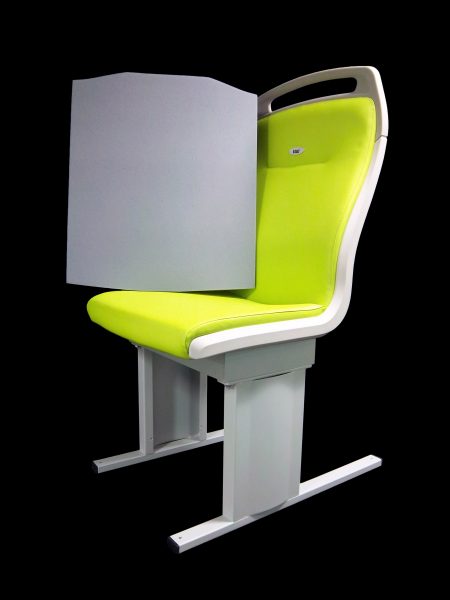 BASF’s open cell melamine foam Basotect® has replaced alternative materials in the seat back cushions of multiple rail car programs on both coasts of the United States. The improved seating can be experienced in the rapid public transportation system serving the San Francisco Bay Area along with the commuter rail system serving Long Island in New York. These new cushion configurations are provided by Rogers Corporation, a global foam manufacturer and converter with their headquarters located in the United States, under their trademark of BISCO® MRF-400.
BASF’s open cell melamine foam Basotect® has replaced alternative materials in the seat back cushions of multiple rail car programs on both coasts of the United States. The improved seating can be experienced in the rapid public transportation system serving the San Francisco Bay Area along with the commuter rail system serving Long Island in New York. These new cushion configurations are provided by Rogers Corporation, a global foam manufacturer and converter with their headquarters located in the United States, under their trademark of BISCO® MRF-400.
The use of Basotect® foam in rail seat backs helps to address two major challenges faced by rail manufactures: light-weighting and fire safety. With a density of <0.60 lbs./ft3 (<9 kg/m3), Basotect® aids in reducing the overall weight of the seats. The corresponding weight reduction of the rail cars helps contribute to increased energy efficiency and enhanced performance. By using Basotect over traditional materials, Rogers Corporation, who is the application expert and the company designing Basotect® into rail seating, created a car seat cushion that is 90% lighter than the traditional foam cushions used in rail seating. “Light weighting is a major concern in the rail industry. By being able to take mass out of the rail cars via the seating, it helps the transit authorities provide public transit that is more fuel efficient with improved overall performance and longevity to the masses”, says Holli Woodard, Market Development Manager of Basotect in North America.
Basotect® also has excellent fire properties. It is made from thermoset melamine resin and is intrinsically fire resistant without adding additional flame retardants. “BASF’s Basotect foam offers a great value to our customers as it allows them to meet strict railcar weight requirements while meeting critical fire safety and performance requirements”, says Faizan Nasir, Market Development Manager at Rogers Corporation. The high flammability resistance and low smoke and heat release aid in the foam’s ability to meet ASTM E1354, ASTM E162, ASTM E662 and EN 45545-2, which all define different regional requirements for fire behavior of materials and components to be used in trains.
Basotect® has high elasticity. The increased flexibility contributes to a more pleasant seat back which provides additional comfort to passengers. With the enhanced flexibility of Basotect® supplying improved comfort, passengers enjoy an overall more pleasing experience.
The manufacturing of rail seat back cushions requires the ability to cut specific contours and detailing into the foam. In this regard, Basotect® is ideal because the melamine foam has flexible processing and design capabilities. A wide variety of cutting options such as the use of blades, sawing and milling enables Rogers Corporation to produce customized parts, making it a model choice for the use in rail seat backs.
About Basotect
Basotect foam has a unique range of properties. Its base material makes it flame-retardant and abrasive; it can be used for high head applications up to 465oF (240oC) and retains its properties over a wide temperature range. Because of its open-cell foam structure, it is light, sound-absorbing, thermally insulating and flexible even at low temperatures. For more information, please visit www.basotect.com
About BASF
BASF creates chemistry for a sustainable future. We combine financial success with protecting the environment and social responsibility. Around 114,000 employees in the BASF Group work to contribute to the success of our customers, in nearly every industry and in almost every country in the world. Our portfolio covers Chemicals, Performance Products, Functional Materials & Solutions, Agricultural Solutions and Oil & Gas. BASF had worldwide sales of around €58 billion in 2016. BASF shares are traded on the stock exchange in Frankfurt (BAS), London (BFA) and Zürich (BAS). For more information, go to www.basf.com.
About Rogers
Rogers Corporation is a global leader in material solutions for rail interiors. BISCO® and Arlon Silicones include a wide range of materials for use as seat cushions seals, gaskets, anti-vibration, floating floors, sound insulation, coil insulation, self-adhering tapes and gangway bellows while meeting global fire safety standards including 49 CFR238, EN 45545 and BS6853. These highly durable solutions protect critical systems, reduce maintenance costs, and perform for the life of the car. For more information, please visit www.rogerscorp.com












